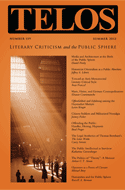Eleanor Courtemanche’s “Marx, Heine, and German Cosmopolitanism: The 1844 Deutsch-Französische Jahrbücher” appears in Telos 159 (Summer 2012). Read the full version online at the Telos Online website, or purchase a print copy of the issue here.
 This article argues that Marx’s economic cosmopolitanism was formulated, in part, as a response to the exiled radical poet Heinrich Heine’s satirical attacks on German nationalism. In Paris in 1844, the young journalist Marx collaborated with the revered Heine on the Deutsch-Französische Jahrbücher, which was meant to join German metaphysics and poetry with French socialist politics. Like Heine, Marx was a secular Jew from the border region of the Rhineland who saw French revolutionary politics as Germany’s inevitable destiny. While Heine wrestles with nostalgia for a backwards Prussia in Deutschland: Ein Wintermärchen (published in Vorwärts! in 1844), Marx’s “Critique of Hegel’s Philosophy of Law” argues that Germany must accomplish a difficult backwards somersault (“salto mortale“) over the dialectical boundary of the Rhine to transcend the impasses of French politics and British industrialism. Both Heine and Marx transformed their critique of Prussian autocracy into a more generalized cosmopolitan radicalism, though Heine’s aestheticism is sometimes confounding to Marxist critics. Meanwhile Marx’s engagement with the German tradition of Nationalökonomie is complex: while he critiques the Prussian nationalist use of free trade theories, the internationalism of his economic vision brings him closer to the British classical tradition of Smith and Ricardo than to German romantic protectionists like Friedrich List.
This article argues that Marx’s economic cosmopolitanism was formulated, in part, as a response to the exiled radical poet Heinrich Heine’s satirical attacks on German nationalism. In Paris in 1844, the young journalist Marx collaborated with the revered Heine on the Deutsch-Französische Jahrbücher, which was meant to join German metaphysics and poetry with French socialist politics. Like Heine, Marx was a secular Jew from the border region of the Rhineland who saw French revolutionary politics as Germany’s inevitable destiny. While Heine wrestles with nostalgia for a backwards Prussia in Deutschland: Ein Wintermärchen (published in Vorwärts! in 1844), Marx’s “Critique of Hegel’s Philosophy of Law” argues that Germany must accomplish a difficult backwards somersault (“salto mortale“) over the dialectical boundary of the Rhine to transcend the impasses of French politics and British industrialism. Both Heine and Marx transformed their critique of Prussian autocracy into a more generalized cosmopolitan radicalism, though Heine’s aestheticism is sometimes confounding to Marxist critics. Meanwhile Marx’s engagement with the German tradition of Nationalökonomie is complex: while he critiques the Prussian nationalist use of free trade theories, the internationalism of his economic vision brings him closer to the British classical tradition of Smith and Ricardo than to German romantic protectionists like Friedrich List.







